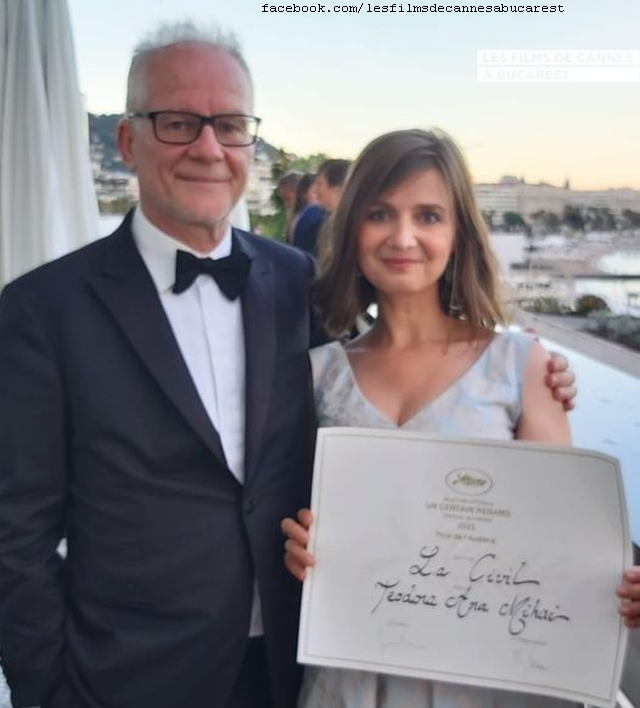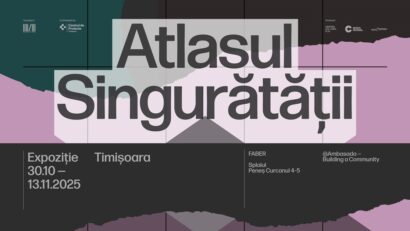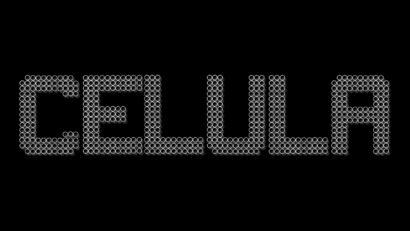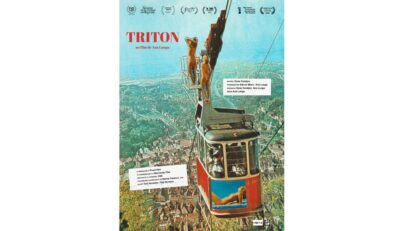Up-and-coming Romanian-born filmmakers scooping awards in Cannes
Teodora Ana Mihai and her audacious prize in Cannes

Corina Sabău, 11.09.2021, 02:00
La
civil, the film directed by Teodora Ana Mihai, scooped the Prix de l’Audace (Prize
for courage) award as part of the Un Certain Regard section at the Cannes Film
Festival, held over July 5 and 17, 2021. This year, the festival’s Un certain
Regard section returned to its original mission and format, that of presenting
the young and the research cinematography. Or at least that is what the general
delegate of the festival, Thierry Frémaux, said, when he announced the section.
La Civil will be distributed by Voodoo Films in Romania. Its premiere is scheduled
sometime this fall, as part of the 12th edition of Les Films de
Cannes à Bucarest Festival, to be held over October 22 and 31st. La
Civil is a Belgium-Mexico-Romania production, involving Menuetto Film in
Belgium and enjoying the support of Eurimages. La Civil has been highly recommended
by several well-established filmmakers, such as The Dardenne Brothers known for
their film production company Films du Fleuve in Belgium or Michel Franco of
Mexico, the director of The Theorem. The director of photography is Marius
Panduru, known among other things, for Policeman, Adjective, Closer to the
Moon, Aferim! and If I Want to Whistle, I Whistle .
La
civil is Teodora Ana Mihai’s first feature film. Teodora was born in
Bucharest, in 1981. In 1989 Teodora Ana Mihai relocated to Belgium, together
with her parents. When she was in high school in San Francisco, California
Teodora discovered her passion for cinematography. She pursued a study
programme with the Film Academy in New York. She began working as a screenplay
writer in Belgium, then she was assistant director. La Civil tells the story
of Cielo, a Mexican mother who is searching for her daughter who was kidnaped
by the members of a drug cartel. The authorities fail to help her so Cielo
decides to go on her own completely. Gradually, Cielo turns from a house wife
into a vengeful activist. La Civil is based on true facts. The film is the outcome
of many years of research Teodora Ana Mihai did jointly with Mexican writer Habacuc
Antonio de Rosario. Initially, when she began her research, Teodora Ana Mihai had
set for herself the task of making a documentary.
Teodora Ana Mihai:
I have been familiar with Mexico ever since I was a child, and the Mexico
I used to know back then was completely different from today’s country. You
were quite safe as you were driving your car, you could go places you were safe
as a tourist as well. Since 2006, when president Felipe Calderón declared war on
drugs, more than 60.000 people went missing, and that political decision had
and still has a strong impact. As I’ve said before, there were a couple of
regions left where you could go as a tourist, there were places where you got
greater safety, but mainly in the northern regions, close to the US border, you
could be in trouble. And as we speak, such a situation is spread rather widely
across several Mexican states. That is exactly why we picked such a topic,
because there is an impending need for a debate on the present situation in
Mexico. It is in no way okay to get out of your house in the morning, going to
work or to school, and go missing, with nobody knowing what happened. I
wondered what it was like to be an adolescent against such a backdrop, what it
was like to be a parent, what it means to live in an insecure society.
Initially, in 2015, when, jointly with Habacuc Antonio de Rosario, I began my
documentation, the idea was for us to speak with as many families as possible,
of the victims of drug cartels. It took us two and a half years to speak with
very many people tackling that scourge, in the event of making a documentary.
We eventually gave up on that idea, as our documentary would have presented
illegal circumstances, sensitive statements, and we did not want to jeopardize
anybody.
Teodora
Ana Mihai and Habacuc Antonio de Rosario gave up on the idea of making a
documentary film altogether. Instead, they decided to tell the story of Miriam
Rodríguez Martínez, a woman who was shot dead right in front of her house after
she found her daughter’s kidnappers and murderers.
Teodora Ana Mihai:
During
the investigation, I met Miriam Rodríguez Martínez, about whom much has been
written as of late, there even was an article in the New York Times, about her activity,
but that occurred four years after she died, unfortunately. We had the chance
to meet her and talk to her, that is how the film’s main character was born,
Cielo, the mother of the girl who was seized and murdered by a drug cartel. After
several failed attempts to find help from the authorities, she tried to do
things all by herself, she went on her own completely. As I was saying, we did
lots of interviews, and my idea, initially, was to write the story from a
teenager boy or a teenager girl’s point of view, but I met Miriam Rodríguez
Martínez, who had found out we were doing our investigation in the region, on
the issue, and told us what happened to her.
Her story prompted me to make my decision, the view point in our film
will be a mother’s viewpoint. The film, in fact, is also a tribute we paid to
her and to all the families who told us what happened to them. Unfortunately,
we heard lots of strong and tragical stories about that.
The
Flanders Audiovisual Fund was the main financier of La Civil. The production
also enjoyed the joint support of Belgium’s Cinematography and Audiovisual
Centre, Romania’s national Cinematography Centre and Eurimages, European
Cinema Support Fund. The filming took place over November and December 2020 in Durango,
Mexico, at the time of the ongoing COVID-19 pandemic was ongoing.
(Translation by Eugen Nasta)






























